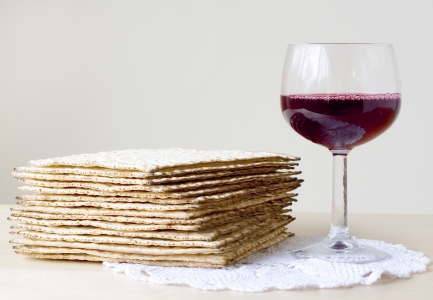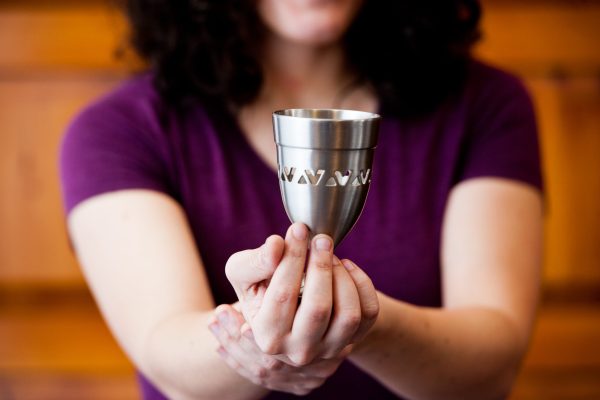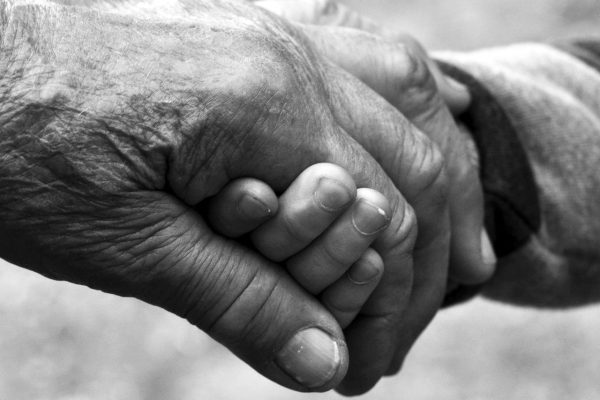What is different about this night? At all other Seders we begin the meal with boiled eggs. Tonight, with edible flowers.
What is different about this night? At all other Seders we place a roasted shank bone on the Seder plate. Tonight, only a cardboard cutout upon which we have written an ethical pledge of sacrifice for the new year.
What is different about this night? At all other Seders we place a roasted egg on the Seder plate. Tonight, only a charred wooden egg which hides secrets within.
What is different about this night? At many other Seders vegan and vegetarian Jews make do by avoiding meat-based traditions or by using meat alternatives. Tonight, only thoughtful and lasting re-inventions of older rituals and deep discussions.
Vegan and vegetarian Jews can feel a certain sadness and loss due to their decisions to opt out of Jewish traditions that involve the use of animal products. Instead of seeking “alternatives” which look, taste, and feel like the “real thing,” I suggest that we get to work inventing new traditions which reflect our ethical commitments. We need a whole new Jewish cuisine! We need vegan dishes that our entire communities will associate with specific holidays and milestone and to which we will look forward all year round.
We also need to do better at replacing the animal products that appear in Jewish rituals. I understand that traditionally observant Jews may see no option when it comes to items like Torah scrolls, mezuzot, and t’filin. Fortunately, Passover offers us the opportunity to begin inventing new and lasting traditions without violating Jewish law.
The changes that I suggest accomplish three goals. They symbolically refer to the very rituals they seek to supersede. This allows us to honor and teach about our past, while also calling attention to our modern ethical commitments. The new traditions also carry the same meaning and will provoke the same sorts of conversations which have been central to the Seder for generations. Finally, they each have a special quality, which will make them feel like old traditions in no time. I anticipate looking forward to them in the coming years. Passover won’t feel the same without them. We just need to get started!
The rituals of the Passover Seder serve didactic and emotional purposes. They lead us to pose and grapple with questions, not only about the holiday itself but also about who we are, what we believe, and what we must do. Four questions, often read by children, inaugurate the retelling of the Exodus, which is the heart of the Passover ritual. The questions begin with observations that the evening’s customs depart from normative practices of communal eating. Those rituals and the objects they involve, therefore, both facilitate and limit the stories we tell and the terms of the discussions we can have.
Three Passover rituals traditionally call for the use of animal products: we place a shank bone and egg on the Seder plate and eat hardboiled eggs with salt water to start our meal. This presents a problem for vegans, vegetarians, and even for meat-eaters who want to accommodate their guests’ ethical commitments. To be clear, none of the food items just mentioned mustmake an appearance at Passover according to Jewish law, which allows for non-meat substitutions.
Yet, as I explained, vegans and vegetarians can nonetheless experience a feeling of loss when they abandon these iconic traditions. We may feel strange if in organizing a Seder for others, we remove from their experience the tastes, smells, and sites which for them – and even for us – constitutes and signifies Passover. Here are a few ideas for how we can solve this problem. As for the gefilte fish, you’re on your own for now.
Boiled Eggs in Salt Water
Many Jewish families also begin the Passover meal by eating a hardboiled egg dipped in salt water. The egg symbolizes the lifecycle and the salt water our tears of pain. The treat reminds us that the world is constantly renewed and gives us hope. It also recalls older, pagan rituals that mark the birth spring and fertility.
Replace the boiled eggs with fragrant and colorful edible flowers. They too recall spring and renewal, while also reminding us, in their ephemerality, that life belongs to a cycle that includes death and mourning.
I like this new tradition because edible flowers have a wonderful and meaning-making quality of uniqueness and difference. Inaugurating the holiday feast with edible flowers, rather than with the boiled eggs to which we are accustomed, will prompt questions – yet more Passover questions – from adults and children alike. This, in turn, offers another opportunity to embellish the Seder with discussion. We can even teach about the almost magical disappearance of the boiled egg.
I like this new tradition most because it has the greatest potential to be assimilated into the expected and longed for sights and flavors of Passover. I can imagine that in just one generation, Jews around the world will look forward to their annual Seder flowers. Homemakers will compete to find the most exotic specimens. And vegan Jews will find total inclusion and comfort in our rituals.
The Shank Bone
The roasted shank bone on the Seder plate reminds us of the paschal lamb described in the book of Exodus. As the ancient Israelites prepared to flee Egyptian bondage, they sacrificed a young lamb and used its blood to mark their doors. This act of faithful co-identification protected their houses from the last of the ten plagues, the death of the first born. The Israelites subsequently offered an annual paschal sacrifice, which created a symbolic link between ritual and history and through which God’s presence and plan transcended human experience.
The shank bone on our table has various meanings for different communities today. It reminds some Jews of our covenant with god. Others consider the shank bone a symbol our lost Temple and invest it with their hope for messianic redemption. Still others consider it an historical relic which respectfully celebrates the supersession of sacrificial Judaism.
Prepare paper or cardboard cut-outs in the shape of a bone. Ask participants to write or draw upon them what they might consider sacrificing this year and for what Passover-related cause. For example, someone might promise to avoid buying clothing produced in sweatshops because Passover teaches us about the horrors of slavery. Observant Jews can prepare their shank bones in advance of the Seder in order to avoid writing on the holiday, which is prohibited by traditional interpretations of Jewish law.
I like this new tradition because it fulfills the obligation to recall the Passover sacrifice, while overtly demonstrating that we now consider it wrong to use animal products in our rituals. If we were to replace the shank bone with a vegetable, traditionally a beat, we would miss the opportunity to make manifest our new ethical commitments while also honoring and teaching about the traditions of old.
I also like this new tradition because it reminds us that sacrifice, however interpreted, remains central to the Jewish tradition. It offers us an opportunity to foster deeper and meaningful Seder conversations, which can help to make Passover feel more relevant to our lives. We each will leave the Seder with a new ethical commitment.
The Roasted Egg
The roasted egg on the Seder plate, the beitzah, represents the festival sacrifice offered in ancient Jerusalem on Passover. According to Jewish tradition, eggs symbolize both mourning and renewal.
Purchase (or prepare) wooden eggs. Char them in the oven or with a blow torch and place them on the Seder plate. I suggest purchasing hollow eggs. (Choose wood over plastic, please!) These can be filled with symbols of the things that we will mourn in the coming year; things of which we will try to let go. To this we may add a symbol of something new to which we are looking forward.
I leave it to you to decide if you want to discuss the contents of your eggs at the Seder. Doing so may foster a more intimate bond between participants. You will also learn how to care better for each other in the coming year. On the other hand, there is also value in secrecy. A silent (or sealed) egg ritual will allow those of us with personal struggles to incorporate them into the Passover ritual without having to reveal too much. The yolk is the chicken’s secret.
I like this ritual because it maintains a reference to tradition by preserving the form of the egg. At the same time, however, it also directs our attention to our ethical commitments and reminds us of our obligation to renew our rituals. I like this new tradition because it transforms the Seder egg into our own egg. The universal meets the personal. Finally, I like this ritual because the knowledge that something secret lies at the center of our egg will lend a feeling of mystery to the Seder. Also by committing to reuse the same egg annually, we gain a ritual item. This is the very stuff of new and lasting traditions!
I wish you all a happy, meaningful, and vegan/animal-friendly Passover. If you adopt one of these new rituals, please let me know how it goes. I would also love to hear about other new traditions that you’ve invented. Find me on Twitter: @jacob_labendz.
First published at: https://jewschool.com/2015/03/36590/new-traditions-vegan-passover/












